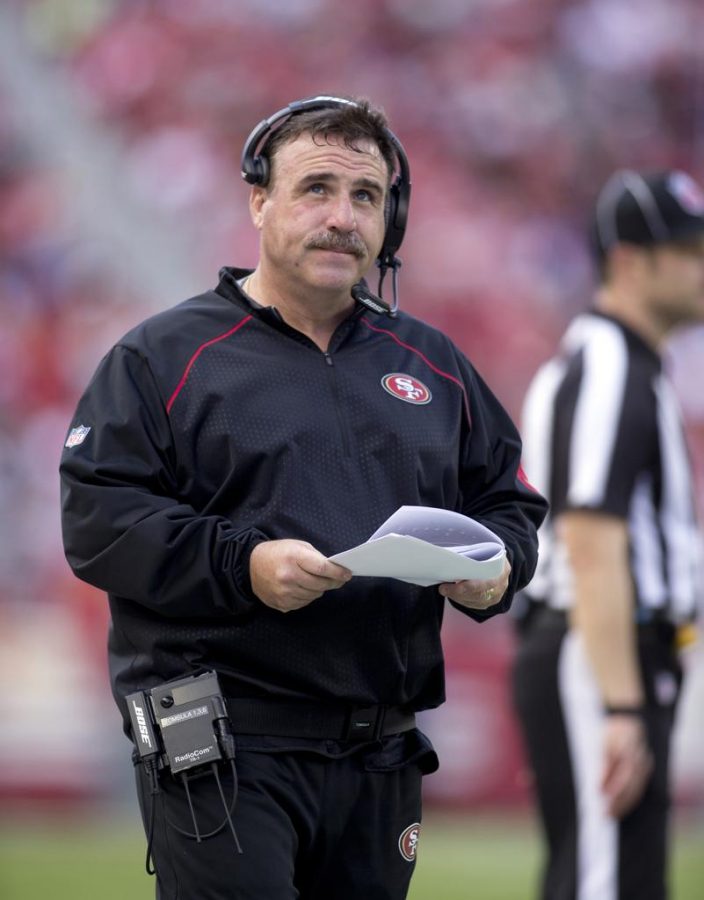With a resumé that included “firewood cutter” and “doormat salesman” and peaked at “NFL defensive line coach,” Jim Tomsula didn’t seem like your prototypical head coaching candidate.
Following the departure of Jim Harbaugh, the 49ers hired and fired Tomsula after he led the talent-deprived San Francisco 49ers to an uninspiring 5-11 record as the head coach. He will now likely never get another chance at a head coaching job.
But his departure is just one of six new head coach openings in the NFL, and all but one of those coaches lasted three or fewer years in their position.
This is not part of some widespread lack of qualified coaches in the NFL — the issue here is that many head coaches do not get fair shots at building a program and instead become scapegoats for team general managers and owners.
A June 2014 article in The Ledger, a newspaper from Lakeland, Florida, said that the average NFL coaching lifespan is 38 months. From 2004 to 2013, 32 teams combined for 68 head coaching changes.
After the 2015 season, owners are only continuing this proclivity for knee jerk reactions.
Tomsula was always an unconventional hire for 49ers CEO Jed York, who thought prioritizing team chemistry would lead to wins, as Tomsula had spent 2007 to 2014 as the team’s defensive line coach. But would Tomsula have left that relative job security if he knew that anything short of pulling off a miracle and dragging the 49ers into the playoffs in year one would result in termination?
Probably not.
“Culture is huge. That’s the difference between a championship-caliber team and a championship team,” York said on July 23.
Tomsula’s quarterback, Colin Kaepernick, continued his regression tour this season, with talent-stricken or injured receivers and running backs not helping the cause. On the defensive end, Tomsula’s forte,, only two 49ers recorded more than three sacks all season. Last season, when Tomsula still coached the defensive line, seven players had three or more sacks.
But this problem reaches beyond Tomsula. Former Cleveland Browns coach Mike Pettine got his pink slip after two seasons, even though he had to manage quarterbacks like the mercurial Johnny Manziel and inconsistent Brian Hoyer. A 10-22 record in that tenure is bad, sure, but not even Joe Lombardi could have salvaged that team. Browns players seem to agree, too.
“I think he’s a good coach. I think he’s one of the better ones we’ve had,” offensive tackle Joe Thomas said.
These general managers are under pressure from the owners to produce instant results. While GMs often have longer leashes than the coaches, their tenures will depend on the quality of their hires. Browns general manager Ray Farmer, fired on the same day as Pettine, gave him a vote of confidence before the season began.
“We’re not going to blow things up. OK?” Browns owner Jimmy Haslam said during training camp. “I think we’re on the right track, so we’re not going to blow things up.”
York was not wrong when he said continuity and chemistry matter in the locker room and on the field. He simply hired the wrong coach.
Look at the Indianapolis Colts and — against all odds — still-current coach Chuck Pagano.
Pagano led the Colts, which made it to the AFC Championship Game last season, to an 8-8 mark this year, missing the playoffs. This disappointing result came on the heels of reported season-long friction between Pagano and GM Ryan Grigson, leading many to assume Pagano was on his way out.
But owner and CEO Jim Irsay retained both Pagano and Grigson, because he said “my hope was for continuity.”
“I’m convinced we have the right stuff on my right and left here to win a world championship,” Irsay said at a Monday press conference. “Not a doubt in my mind.”
All-Pro quarterback Andrew Luck’s injury-riddled season, in addition to a few underperforming signees, were the main factors in a disappointing year for the Colts, not Pagano’s coaching. The free agent signings are partially Grigson’s fault, but what about Luck’s injury?
Irsay seemed to at least recognize that bringing a Luck-less Colts to a .500 record is a laudable coaching feat, so he didn’t fall in line and continue with the trend.
Certain NFL coaches certainly deserve the axe, even with short tenures. The Eagles’ Chip Kelly turned a playoff team in his first year to a 7-9 one just two seasons later. And Kelly cannot blame the management decisions for his team, because he oversaw team personnel decisions. Kelly made a few head-scratching moves to ship out high-caliber players, believing more in his system than individual merit.
“As I watched this season unfold, I determined that it was time to make a change,” Eagles CEO Jeffrey Lurie said when announcing Kelly’s firing in December.
Team success almost always stems from good coaching, but team failure comes from a number of factors, at least initially. Sustained seasons of mediocrity can shove some blame onto the coaches behind it, but no coach can enter a floundering program and instantly turn it into a contender, especially when dealing with as stark a transition as Tomsula’s.
The mantra doesn’t appear to be shifting in the NFL, though. It’s either pile up wins or pile up your things on your desk. Patience no longer exists.


